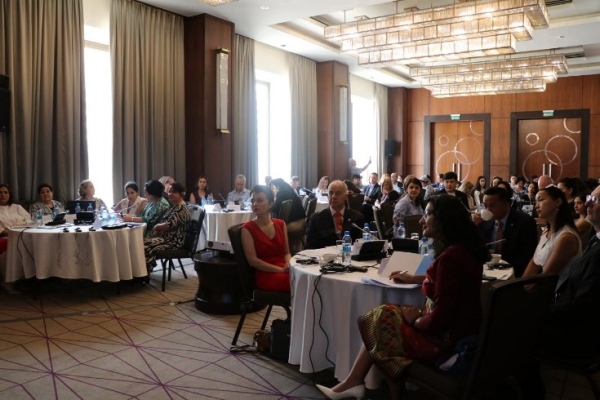
UN Women Tajikistan facilitated a roundtable discussion with local project partners, international non-governmental organizations (INGO's), the Committee on Women and Family Affairs, and other government entities in Tajikistan. The event marked the successful conclusion of the "Gender-Based Violence (GBV) Prevention and Response in Tajikistan" project, funded by the United States Department of State’s Bureau of International Narcotics and Law Enforcement Affairs (INL). The roundtable on "Addressing and Responding to Gender-Based Violence (GBV): Successes, Challenges, and Coordination Efforts" convened 70 participants from a wide range of organizations in Dushanbe, Tajikistan. Attendees includes representatives from the government, international organizations, public institutions, gender equality experts, women's rights activists, journalists, and media professionals. This diverse gathering aimed to foster dialogue and collaboration among key stakeholders, highlighting successful strategies, identifying persistent challenges, and enhancing coordination efforts to effectively address and respond to GBV.
The roundtable served as a pivotal platform for exchanging insights on both successes and challenges encountered while implementing state policies to prevent domestic violence. It provided a valuable opportunity to evaluate the collaborative efforts between the government and non-governmental organizations in combatting violence throughout 2023 – 2024. The discussions emphasized the importance of sustaining these efforts beyond the project's completion.
The roundtable was held with the active participation of Ms. Umeda Abdullozoda, Deputy Chairperson of the Committee on Women and Family Affairs of the Government of Tajikistan.
She said: "Thank you for these projects and your unwavering support to the women and girls of the Republic of Tajikistan in addressing this issue. The extensive social activities and efforts undertaken by the Government of Tajikistan today will undoubtedly contribute to the reduction of gender-based violence".
Key topics discussed during the roundtable included:
• Policies and strategies by the Committee on Women and Family Affairs (CoWFA) aimed at promoting gender equality and enhancing public awareness;
• The impact of the "Gender-Based Violence (GBV) Prevention and Response in Tajikistan" project on supporting state policies, achievements, challenges, and future prospects;
• Results from the post-assessment of public awareness regarding gender-based violence in pilot districts;
• Introduction of the mobile application "Be Zurovari," developed as part of the project.
The roundtable was honored to host Mr. Manuel Micaller, Jr., Ambassador of the United States to the Republic of Tajikistan, who commenced the proceedings with a welcome speech, acknowledging the significant contributions and capacity-building achievements of the GBV project in Tajikistan over the past two years.
Ambassador Micaller highlighted the program's impact on strengthening Civil Society Organizations (CSOs) across the country. expressed strong encouragement, stating that, “Gender-Based Violence is not just a women's issue, but a societal issue. it is very important for men to engage as allies in the fight for women's rights.”
"We all know that gender-based violence is a human rights abuse and, at the United Nations, we say “No” and practice Zero tolerance towards Gender-Based Violence. Partnering with the Government of Tajikistan, we strive to eliminate all forms of discrimination and uphold equal rights for women and girls. Gender equality is the cornerstone of the United Nations' mission, underpinning human rights, development, and peace and security. It is essential that we uphold these values in our collective fight against gender-based violence."- commented Ms. Parvathy Ramaswami , UN Resident Coordinator in Tajikistan.
She further stated that "Today's roundtable on addressing gender-based violence marks the culmination of a project dedicated to eradicating one of society's most harmful practices. Let us celebrate the strides we have made and reflect on the experiences that guide our ongoing and future actions towards achieving gender equality."
The event showcases positive international experiences, including insights from experts from Kazakhstan who discussed the impactful case of Saltanat Nukenova—a notable example of successful advocacy against domestic violence that led to legislative reforms and stricter penalties for offenders. This case served as a poignant example for roundtable participants, illustrating how legal and social reforms can effectively combat gender-based violence. Aitbek Amalgeldy, brother of Saltanat Nukenova, also addressed the roundtable, underscoring the pivotal role of personal initiatives in driving meaningful change in the fight against domestic violence.
"By openly discussing GBV at such events, we can dismantle the stigma that surrounds it and empower survivors to come forward. It is a call to action for each one of us – participants of this roundtable to stand up, speak out, and work together toward a world where everyone can live free from violence and discrimination. Our strength lies in our collective efforts, commitment, and dedication towards a just and equal world."-said, Ms. Malika Jurakulova, Head of Office of the UN Women Tajikistan.
Following the roundtable discussions, all key stakeholders—including local authorities, CSOs, INGOs, and donors—unanimously agreed on the imperative need for collaborative efforts through an integrated approach to combat gender-based violence and strengthen victim support services. Participants emphasized the critical importance of forging robust partnerships, sharing resources, and coordinating initiatives across sectors and organizations. They affirmed that unified action and mutual support among stakeholders are crucial to effectively addressing the complex challenges posed by gender-based violence and fostering lasting positive impacts in communities.
“Empowerment is not only a matter of equality, but also a struggle against violence against women based on preconceived notions of gender.’ ‘True strength is not in violence, but in fighting it,”-shared Nargis Saidova, head of the NGO Gender and Development
The roundtable was conducted within the framework of the “Gender-Based Violence (GBV) Prevention and Response in Tajikistan” project, implemented by UN Women Tajikistan in partnership with public organization “Gender and Development” and funded by the Bureau of International Narcotics and Law Enforcement Affairs (INL) of the U.S. Department of State.




